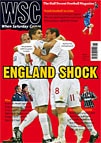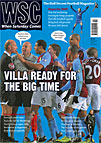 Dear WSC
Dear WSC
In WSC 272 Jonathan O’Brien finds it remarkable that Celtic’s Bertie Auld “straightfacedly asserts that beating Dunfermline in the Scottish Cup final in 1965 was more important than the title win a year later”. But Auld is not alone in his assertion. No less a man than Jock Stein said in the Dunfermline history Black and White Magic: “It wouldn’t have gone as well for Celtic had they not won this game.” The Celtic history The Glory and the Dream also notes: “The largest framed photograph in [Stein’s] office at Celtic Park showed Billy McNeill borne aloft at the end of the match.”Celtic had won nothing since “the 7-1 game”, a freakish League Cup final triumph over Rangers in 1957. So this win, Stein’s first trophy seven weeks after officially becoming manager, stopped a rot which was threatening to turn Celtic into also-rans in Scotland. Without it the Lisbon Lions may never have been and there may only ever have been one “nine-in-a-row” in Scottish football. And that would never do.
Mark Murphy, Chessington
Search: 'Howard Wilkinson'
Stories
 Taylor Parkes reflects on a new book that paints a gloomy picture of how young players are treated in Britain
Taylor Parkes reflects on a new book that paints a gloomy picture of how young players are treated in Britain
In 1997, concerned that English football was falling behind in terms of youth development, the FA brought in Howard Wilkinson (then, as now, the last English manager to win the League). His mission was to produce a document which would outline the problems and propose a fresh approach; the amusingly titled A Charter for Quality still forms the basis of our youth coaching system. Its changes were far-reaching: clubs would take sole charge of recruiting and developing young players, while the age at which kids could be taken on “full time” dropped from 14 to nine. In the first half of last season, just 66 graduates of Premier League academies appeared on Premier League teamsheets, many of them confirmed benchwarmers. What went wrong?
 Dear WSC
Dear WSC
Bruce Wilkinson (WSC 267) pointed out that ticket queues “seem a quaint ritual of a bygone age”. Waiting in a virtual internet queue bears no similarity to lining up outside the box office. I have my tickets for the FA Cup final, but I do not feel as if I earned them. Instead of getting up in the middle of the night, crossing London, losing half a day’s work, standing in the rain shuffling forward inch by inch while nervous that there are too many punters and too few tickets, I merely sat in my dressing-gown in front the PC. There is no one to talk to in the “virtual waiting room”. Your opportunity is allotted randomly. Suddenly it’s all over and you have what you came for. One should be happier as the process is simple and efficient and the desired result achieved, but somehow it feels like a hollow victory as it lacks the sense of accomplishment joy and triumph of the old-fashioned process. You can’t even wave the tickets in triumph above your head as they are sent by post.Obviously my complaining about the changes that actually improve my life marks me down as “old”. I am not asking to bring back rickets and polio and to repeal the Factory Acts but I do miss a modicum of discomfort and inconvenience. The old experience was akin to standing on the terraces or being subject to the over-zealous policing that used to mark us out as a tribe. Under the new regime the tickets are yours if your broadband speed is faster and your credit card more golden than the next, rather than if you have more commitment stamina and perseverance.Will the ultimate progress be when we treat football like theatre and opera by dressing-up smartly for the occasion and ordering our interval drinks? Or is that Club Wembley?
Patrick Sheehy, London
 Some are wild cards, some club stalwarts. Jon Spurling looks at the life of the acting manager
Some are wild cards, some club stalwarts. Jon Spurling looks at the life of the acting manager
Newcastle and Sunderland rarely admit to having anything in common, yet the clubs’ recent moves to formalise the positions of Joe Kinnear and Ricky Sbragia represents a rare moment of triumph for caretaker managers. The fact that both clubs hankered after bigger names suggests that neither man’s position is secure, but at least they are likely to emerge with their self respect intact, unlike many hapless interim appointments.
 Al Needham remembers Jimmy Sirrel, Nottingham’s second most famous football manager, who died last month
Al Needham remembers Jimmy Sirrel, Nottingham’s second most famous football manager, who died last month
It’s very easy to see Jimmy Sirrel, who died on September 25 at the age of 86, as someone who worked in the shadow of Brian Clough; a decent enough manager who did his best with extremely limited resources, but could only look on while his neighbour on the other side of the Trent took the glory. That is not the case at all. Sirrel was just as important to the ’Pies as Clough was to the Garibaldis.